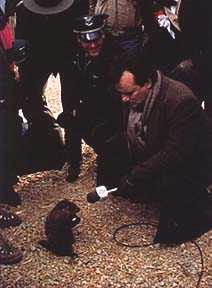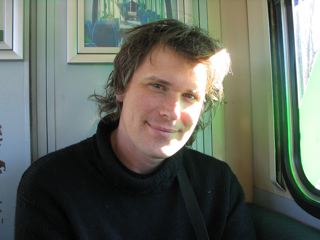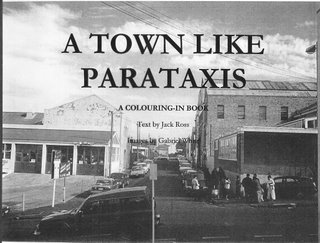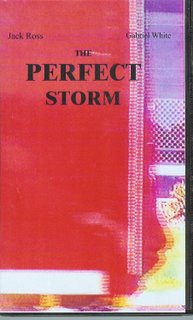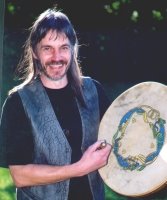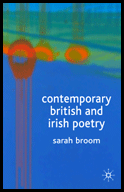
For this week's post I thought I'd reprint a review which Alistair Paterson commissioned for
Poetry New Zealand [33 (2006): 96-101]. The
book is by my friend Sarah Broom, and it seems to have already attracted quite a bit of favourable comment in the UK, where it was published.
Sarah Broom, Contemporary British and Irish Poetry: An Introduction. Basingstoke & New York: Palgrave Macmillan, 2006.
There’s a scene in the 2003 film
The Sleeping Dictionary where a newly-appointed British colonial officer is disconcerted to find a Dayak headhunter who can recite the names of the Kings and Queens of England. The two alternate rattling off the dreary list for quite some time until they get to Edward VIIII (it’s the Abdication year: 1936). “You left out Queen Anne,” remarks the headhunter. “
You left out Stephen” is the young Oxonian’s terse response.
English poetry used to seem a bit like that: a set of clear-cut generations with their stars and also-rans. The twentieth century began with the Georgians (Brooke, Masefield, de la Mare), then the War poets (Graves, Sassoon, Owen), then the Modernists (Wyndham Lewis, T. S. Eliot, Pound), then the Leftist thirties (Auden, Spender, MacNeice), then the forties and the New Apocalypse (Dylan Thomas, Keith Douglas, Henry Treece), then the fifties and the Movement (Amis, Larkin, Wain), then the sixties and the Mersey Beat, then the seventies and … at about that stage the patterning ran dry. Who could make sense of the warring voices of the present? All those manifestos, slim volumes, blaring voices? What seemed certain was that at some crucial stage something had changed, the centre of gravity had shifted.
In New Zealand (about as far from literary London as a Dayak longhouse, I suppose) that shift was very clear. All of a sudden the literary gods lived in New York. American Modernism now ruled the roost. William Carlos Williams, Wallace Stevens, Robert Lowell had taken up the slack when the British faltered. One can observe the moment of change in the shift from 1950s Curnow (
A Small Room with Large Windows) to 1970s Curnow (
An Incorrigible Music).
It was, after all, a bit hard to get excited about post-fifties British poetry. There was Larkin whinging on about how miserable he was, and cataloguing the dreary appurtenances of what sounded like a used-up country. There was R. S. Thomas being grim and craggy. There was Geoffrey Hill being even grimmer and craggier. By contrast, there were the Americans, energetic, vital, sexy, humorous –
New World. From the mid-sixties onwards America became the centre of the poetic universe (in English, at any rate).
And so the litany became: Williams and the Objectivists, Ginsberg and the Beats, Lowell and the confessional poets; then, in the 1980s, Ashbery and the L*A*N*G*U*A*G*E poets. As a result, we gradually lost sight of British poetry. The odd gleam shone out here and there: Seamus Heaney (but he was Irish), Douglas Dunn (a Scot), the odd wild man like Tom Raworth or Jeremy Prynne, but otherwise the visionary gleam seemed to have departed for good for more congenial climes.
But here comes Sarah Broom to set the record straight. Her book
Contemporary British and Irish Poetry is designed specifically to answer the question “What happened then?” She concentrates on the poetry written over the last two decades in the British Isles and demonstrates, in the process, that the scene there is anything but moribund – on the contrary, that what is moribund is that old-fashioned recitation of schools and influences we memorised in English class. If the tangled, complex biosphere of Caribbean poets, feminist poets, gay poets, Irish & Scottish Nationalist poets, experimental and postmodern poets that constitutes contemporary Britain can’t be neatly summed up under one convenient label, then it’s time to junk the model.
“Death,” as Auden so succinctly put it, “of the Old Gang.”
*
At this point in the argument, I have to declare an interest. I know Sarah Broom. In fact, she’s a friend of mine. More to the point, I’ve witnessed various parts of the long process of compiling her book.
Does this predispose me in her favour? I don’t honestly think so. I was quite prepared for this to be another disappointing piece of academic discourse about other people’s creativity, writing that makes no serious attempt to engage with a living audience.
Which is why it’s such a huge pleasure to be able to say that I thoroughly enjoyed reading Sarah’s book, and that I found it profoundly informative about a number of writers and movements I’d had the sketchiest ideas about previously.
[
Insert: a seminar room at Massey University. Dr Sarah Broom is giving a seminar on modern Scottish poets’ responses to devolution; Jack (as honorary Scot – by virtue of descent and four years’ study at Edinburgh) has been deputed to read out various pieces of Glaswegian in his best “Eh Jummy!” voice. The faces around the table assume a polite rictus of disbelief as the appalling racket goes on – and on …]
Like so many other books of this type, it began as a Doctoral thesis. What is unusual about it is how much it has improved along the way: how much the long process of turning it into lectures and seminar papers, and then reassembling it into this “introduction for students” has clarified its lines of argument.
The secret to Sarah’s success, I think, is sympathy. A good defence attorney, she tries to make the strongest possible case for each of the representative poets she has chosen. There are 24 of them in all, divided into seven chapter-categories, so you can see that requires a good deal of tolerance.
My own personal lowpoint would be, I think, Eavan Boland (b.1944) whose musings on her own status in Irish life and letters include the stirring reflection that when the younger generation of Irish women writers try “to combine writing and parenting”:
I wrote like that once.
But this is different:
This time, when she looks up, I will be there. [122]
I suppose that W. B. Yeats got a bit above himself at times – all those exhortations to Irish poets to “learn your trade, / Sing whatever is well-made” – but for sheer arrogant silliness this remark of Boland’s takes some beating.
What I admire about Sarah’s writing, though, is that she is content simply to present the bathetic posturing of Boland’s verse without feeling the need to put the boot in:
Come back to us
they [“the collective of Irish women through history”] said:
Trust me I whispered [121]
“It is tempting to read ‘Mother Ireland’ in this case as representing Boland herself,” is Sarah’s deadpan comment on this passage. This is, of course, a perilous critical strategy. If you allow ironic juxtaposition to convey your reservations about certain poetic approaches, there’s a risk that you’ll be read as wholeheartedly endorsing them.
Sarah clearly sees herself as more of an anthologist than a legislator, though, and her chief regret seems to be the number of poets she’s been forced to leave out for one reason or another (there’s a list of 29 of them in the preface, including such names as Tom Paulin, Derek Mahon, Paul Durcan and even Geoffrey Hill). It’s a measure of her success as a commentator that one does indeed regret not being able to hear her views on these writers. Certainly I finished each chapter of Sarah’s book feeling I’d learned something new, even about poets such as Heaney and Tony Harrison whom I’d been reading for years.
If Boland shows the perils of Sarah’s catholicity of taste, I feel her two chapters ‘a fusillade of question marks’ (about the Troubles in Northern Ireland), and ‘The Tribes of Poetry’ (about postmodern poetry in Britain) show its strengths.
Of course I’d heard of
Peter Reading. I think I even owned a volume of his selected poems. It wasn’t till I read the discussion of him in Sarah’s final chapter, though, that I realised just how profoundly odd and interesting his poetic project actually was. My first act on finishing her book was, in fact, to order his collected poems on Amazon.com, and you can’t ask for a more ringing endorsement than that. She quoted just enough lines from
Perduta gente (1989) his episodic narrative of London’s lost people, to make me realise that I needed to read it at once:
sometimes it seems like a terrible dream, in
which we are crouching
gagged. disregarded, unsought
in derries, dosshouses and spikes,
and from which we shall awake,
mostly, it seems, though, we won’t. [249]
Reading’s curious mix of discordant subject-matter, technically precise verse and formal innovation was just too exciting to be ignored.
It’s not just a question of poetry, you see.
I was there. I lived in Britain in the late 80s. Edinburgh is, admittedly, a much harsher place for the homeless than London (you either migrate south or die when winter begins – and it seems to last at least nine months a year). They were always there, though – on the borders of our vision. I remember one man joining in our philosophical discussion on the steps of the university library before, with elaborate periphrasis, making the inevitable demand for change. I also recall a friend of mine describing a couple she’d seen walking down the Grassmarket who were smiling as if proud of their brand-new status. Their clothes, she said, were still shiny and new, as if they’d just walked out of the old life that day.
It was a world where farmers proudly turned their livestock into cannibals, where Thatcher’s ministers took the concept of “plausible deniability” (i.e. lies) to a whole new level. It was the time of the poll tax, where Scotland had become a laboratory for testing out ideas too extreme even for the English. Reading’s book, then, for me, is as much a palimpsest of memories and impressions as a Dantesque charting of the lower depths. What is certain is that its inner seriousness utterly exposes the hollowness of so much of what so facilely passes for poetry nowadays.
I suppose that’s also my attraction to Sarah’s chapter on Northern Ireland. For once a set of modern poets came face to face to with the real thing: a real live civil war, with snipers, bombs, and oppressive occupiers. In the age of television, the violence suddenly erupted off the screen. The discussion here of Seamus Heaney’s approach to the victims of the troubles, his perhaps too-ready tendency to see them as martyrs, sacrificing themselves for the community like the neolithic Tollund man, is subtle and illuminating The real surprise for me, though, was the next poet she discusses, Michael Longley.
And when they had dragged Melanthios’s corpse into the haggard
And cut off his nose and ears and cock and balls, a dog’s dinner,
Odysseus, seeing the need for whitewash and disinfectant,
Fumigated the house and the outhouse … [159]
In these lines from
Gorse Fires (1991), Longley unpacks a little of the sickening violence which has always been basic to European culture. The analogy with the events of his own lifetime is clear:
He collapsed beside his carpet-slippers
Without a murmur, shot through the head
By a shivering boy who wandered in
Before they could turn the television down
Or tidy away the supper dishes.
To the children, to a bewildered wife,
I think ‘Sorry Missus’ was what he said. [155]
*
Eugenio Montale, a man of singular integrity, who managed somehow to live through the Fascist era, the second world war, the boom, even the Dolce Vita, wrote in “A Poet”:
I hope
I shall have some way to dedicate my poor songs
to the next tyrant …
He will be eager for spontaneous praise
gushing from a grateful heart
and he’ll have it, in abundance.
At the same time I’ll be able to leave
a lasting mark. In poetry
what counts is not the Content,
it’s the Form.
[trans. Kendrick Smithyman]
Is that correct?
Is that what counts, not the content but the form? I was having an argument about it (or rather, a discussion – we didn’t actually come to blows) the other day at a dinner-party. My interlocutor quoted from a radio interview he’d just heard with the Booker prize-winning novelist John Banville, who said that when he sat down to write
The Sea he’d done so with the deliberate intention of producing a work of art. It was technique alone, apparently, that counted.
Far be it from me to judge John Banville or his book. I haven’t read it. It clearly pleased a number of competent judges, or it wouldn’t have won the prize. The question is, will we still want to read it in twenty years time? fifty years? a hundred?
That, it seems to me, is more a question of content than form.
Sarah Broom’s book offers a window on a number of poets whom I’m sure we’ll be reading for the rest of this century, but also a number we won’t. If the fag-end of the twentieth century has told us anything, it’s that ironic detachment generates very little heat. You can idle an engine only so long before it stalls. For me the most memorable poems / poets in this volume are the ones who engage most fully with the external world around them.
Robert Lowell’s sonnet on Flaubert ended, originally, with a quote from the writer’s mother, who complained that “the mania for phrases dried his heart.” When he rewrote it, the new version ended: “Till the mania for phrases
enlarged his heart.” That’s the paradox the best of these poets – the Readings, Heaneys., Longleys, Muldoons, Carsons – engage with: the search for a technique which can illuminate, not starve, the human heart. On the evidence of Sarah’s book, these few of them (at least) have been brilliantly successful.







